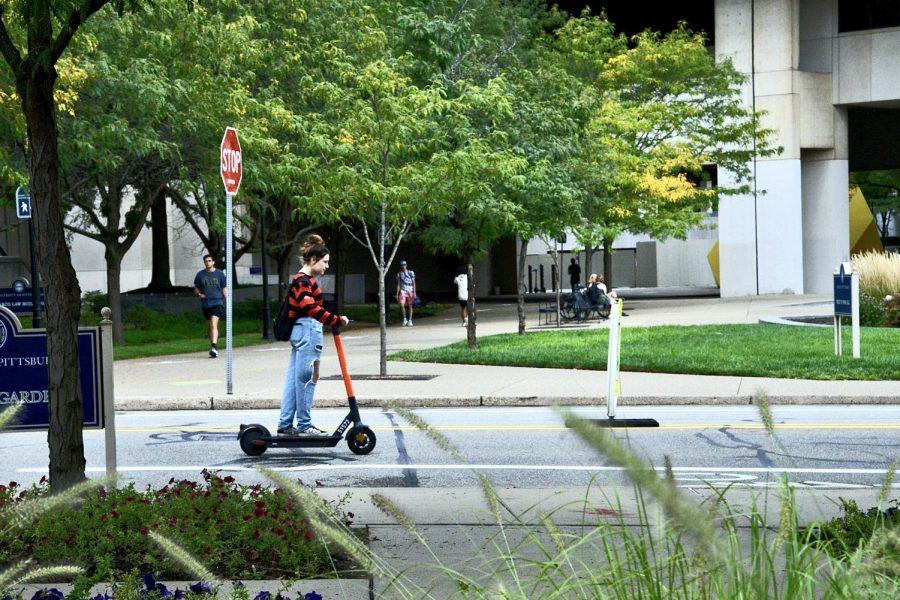Pitt students travel in style with new Spin scooters
Aaiush Jain | Staff Photographer
The Move PGH project partnered with Spin, a company that produces electronically charged vehicles, on July 9, making electric Spin scooters available throughout Pittsburgh.
September 7, 2021
Pitt students probably noticed an increased number of scooters around Oakland, either parked along the sidewalk or zooming by.
Spin, a company that manufactures and designs electronically charged vehicles, partnered with the City’s MovePGH project on July 9 to provide the city with Spin scooters. According to the website, Spin is active on other university campuses across North America, including Ohio State University, University of California San Diego, Duke University and Texas State University.
Using the Spin app, students can see the location of scooters and charging stations — known as Spin Hubs — as well as the scooter’s price. To activate the scooter, riders must use the app to scan the scooter’s QR code and make an online transaction via credit card or Apple Pay.
To activate the scooters, riders must pay $1, and then 39 cents per additional minute. The scooters can then be controlled by two pedals and the handlebar. Returning the scooters to Spin Hubs — located along Forbes Avenue at the corners of both South Bouquet Street and Schenley Drive — is optional, but doing so will grant riders $1 off their next ride.
An ordinance introduced by Mayor Bill Peduto’s administration on Tuesday, says the scooters must be ridden standing up by people 18 years or older. Riders are also required to stay under 15 mph, and must remain on streets with a dedicated “pedacycle” lane or on a street with a 25 mph maximum speed limit. Pittsburgh’s City Council will likely discuss this legislation next Wednesday.
Scooters will also be required to be parked perpendicular to the curb in a legal parking space or next to a bicycle rack, according to the ordinance. Since the scooters were first introduced, some community members have complained about illegally parked scooters.
Students said they utilize the scooters for multiple reasons — for practical purposes or pleasure. Emery Zhang, an undeclared sophomore, said he recently used the scooters to get back to his dorm after a day of classes.
“I usually use it to go back to my dorm, which is in upper campus at Irvis and sometimes between classes because it’s quicker than walking,” Zhang said.
Zhang said he thinks the scooters are usable due to their “reasonable” price.
“I think they are pretty reasonable, considering how they’re a rental there, but they still try to keep the prices low,” Zhang said. “So the students are — it’s accessible to students and other people who want to ride it.”
Zhang said the scooters are an improvement to other vehicles such as bikes, even though it took him 15 minutes to figure out how to use one.
“They have a motor and you can take them to places up the hill, usually because bikes — they’re still human power — you need to ride it,” Zhang said. “It takes up your energy, especially when you’re walking around to classes and getting tired and stuff.”
Zhang’s longest trip with the scooter was to and from Schenley Park, but he said they’re better for short-distance trips.
“These things charge a lot anyways, like when you do them long distance, so I think they’re better for short distance trips up and down around campus,” Zhang said.
Ben Robinson, an undeclared sophomore, also said the scooters are easy to use, unlike Bird, a competitor which is known for its poor battery capacity.
“It doesn’t take much time to learn how to ride it,” Robinson said, “Bird had problems with that, but not these.”
Jessica Weinthal, a senior psychology and theater arts major, said she uses the scooters on late nights to return to her dorm, on time crunches and to escape bad weather. She added that she feels the scooters can be somewhat overpriced, depending on a destination’s location.
“I feel like getting down the street like from one block to another shouldn’t cost $2.50,” Weinthal said. “But maybe that’s also, I don’t know, maybe that’s my personal opinion. I do only take it when I am in a time crunch or if I really got to get somewhere or if the weather’s really shitty.”
Weinthal also said the scooters are better than human-powered bicycles, but she needed to get used to the instant acceleration of the scooter before getting a handle of riding it.
“There’s a really big pickup on these scooters,” Weinthal said. “It goes from zero to probably seven or eight [miles per hour] quickly.”
Robinson said a perk of the scooters is that they can be used for “anything.”
“I mean, just for anything, really”, Robinson said, “Sometimes getting to classes, sometimes it’s just kind of fun to ride.”



